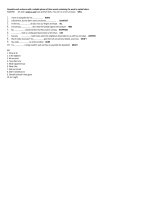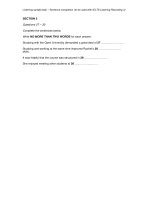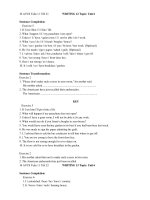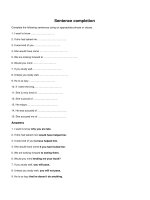Low advanced sentence completion 5
Bạn đang xem bản rút gọn của tài liệu. Xem và tải ngay bản đầy đủ của tài liệu tại đây (540.8 KB, 5 trang )
englishforeveryone.org
Name________________
Date________________
●Sentence Completion 5 (low-advanced SAT level)
Directions: Choose the best word(s) to complete each sentence.
1. In the 1970s, gas prices rose drastically
because of ______ of oil entering the
marketplace; as with any commodity, gas
prices are impacted by the basic laws of
supply and demand.
A.
B.
C.
D.
E.
a zenith
a glut
a graft
an inundation
a modicum
2. Much of Moliére’s work was satirical in
nature; in Tartuffe, for instance, he
______ much of French high society,
including church leaders.
A.
B.
C.
D.
E.
admonishes
lampoons
immortalizes
lionizes
ensconces
3. The coach was dismayed to find that his
team was unable to get past its ______
start; rather than being ______ in the
second half, the team remained lethargic
throughout.
A.
B.
C.
D.
E.
slipshod ... enumerated
slow ... enervated
slapdash ... endured
sluggish ... energized
slothful ... enamored
4. In On the Road, Jack Kerouac
documented the ______ lifestyle he and
other members of the Beat generation
practiced; rather than settle down in one
place, many of them would move around
from coast to coast.
A.
B.
C.
D.
E.
transient
myopic
pedestrian
untenable
orthodox
5. One of the most effective ways to resolve
conflict is to seek an outside mediator,
someone who can hear both sides of the
argument and attempt to ______ the
angered parties.
A.
B.
C.
D.
E.
inflame
pacify
outwit
bolster
beseech
6. Once the District Attorney convinced the
______ star witness to testify, her once
______ case suddenly appeared more
than sufficient.
A.
B.
C.
D.
E.
obsolete ... scanty
ruthless ... sanguine
duplicitous ... illusory
reluctant ... flimsy
paltry ... obstinate
Answers and Explanations
1) E
To figure out what the missing word is, try to predict its definition by using key
words from the prompt. Here, the key word is “rose,” as the prompt explains that
gas price rose because of the missing word. The prompt gives one other piece of
key information, stating that supply and demand impacts gas prices. The basic
law of supply and demand states that the smaller a supply of a product, the more
it will cost, assuming nothing has impacted the demand. Since gas is something
almost everyone needs, if its price rose, the supply likely decreased. Thus, the
missing word here must mean something that implies a decrease. (E) provides
the best choice, as modicum means limited quantity.
(A) is incorrect because zenith means peak or summit. It is the opposite of the
word the prompt is looking for, as the prompt requires a word that implies a
decrease in the amount of oil entering the marketplace.
(B) is incorrect because glut means overstock. It is the opposite of the word the
prompt is looking for, as the prompt requires a word that implies a decrease in
the amount of oil entering the marketplace.
(C) is incorrect because graft means a piece of transplanted tissue. It has
absolutely no connection to anything else in the prompt.
(D) is incorrect because inundation means an overwhelming amount. It is the
opposite of the word the prompt is looking for, as the prompt requires a word that
implies a decrease in the amount of oil entering the marketplace.
2) B
To figure out what the missing word is, try to predict its definition by using key
words from the prompt. Here, the key word is “satirical,” as the prompt uses
Tartuffe as an example of how Moliére’s work is satirical. Thus, the missing word
must mean something that implies that Moliére satirized “French high society” in
Tartuffe. Choice (B) provides a word that carries that implication: lampoons
means ridicules.
(A) is incorrect because admonishes means warns and, thus, does not relate to
the fact that Moliére’s work is satirical.
(C) is incorrect because immortalizes means bestows unending fame upon,
implying that Moliére celebrated “French high society,” even though the prompt
calls his work, not lauding, but satirical.
(D) is incorrect because lionizes means treats as a celebrity, implying that
Moliére celebrated “French high society,” even though the prompt calls his work,
not lauding, but satirical.
(E) is incorrect because ensconces means settles comfortably. Thus, ensconces
does not relate to the prompt at all.
3) D
To figure out what the missing words are, try to predict their definitions by using
key words from the prompt. The key word for the first missing word is “lethargic,”
which means drowsy. As the team “remained lethargic throughout” the game, it
must have had a lethargic start. The second missing word also hinges on
lethargic but must have an opposite meaning, as the prompt makes it clear that
the coach had hoped the team would overcome its lethargic start in the second
half, though this did not happen. Thus, the second missing word must mean
something like “not lethargic.” Thus, (D) is the best choice, as sluggish means
lethargic or slow and energized means invigorated. One who is invigorated would
not be likely to be lethargic.
(A) is incorrect because slipshod means untidy and enumerated means listed.
Neither word relates to the prompt.
(B) is incorrect because only one of the words works in context. While slow is
synonymous with lethargic, enervated means weakened and cannot work in
place of the second missing word, as the second missing word has to mean the
opposite of lethargic. An enervated team would be likely to remain lethargic.
(C) is incorrect because slapdash means haphazard and endured means lasted.
Neither word really relates to the prompt.
(E) is incorrect because only one of the words works in context. Slothful means
lazy and could work for the first missing word, as both relate to lethargy, but
enamored means in love, a concept that does not relate to this prompt.
4) A
To figure out what the missing word is, try to predict its definition by using key
words from the prompt. Here, the definition of the missing word is basically given
after the semicolon: the lifestyle was defined by “moving around from coast to
coast.” Thus, the missing word must be something that means moving around.
(A) is correct, as it offers such a word: transient means staying for a short time.
(B) is incorrect because myopic means shortsighted, which is not defined by
moving around a lot.
(C) is incorrect because pedestrian refers to walking. While most members of the
Beat Generation probably were able to walk, the prompt discusses the lifestyle of
moving around a lot, not just the ability to walk.
(D) is incorrect because untenable means indefensible, a word that is not defined
by moving around a lot.
(E) is incorrect because orthodox means traditional, a word that would neither
describe the Beat Generation nor one who moves from coast to coast.
5) B
To figure out what the missing word is, try to predict its definition by using key
words from the prompt. The keyword here is “resolve,” and the prompt makes it
clear that the goal of a mediator is conflict resolution. Thus, the missing word
must be a verb that would at least contribute to conflict resolution. Of the answer
choices, only (B) provides such a word. Pacify means soothe or calm down, and
angered parties would probably have to be soothed or calmed down before they
could effectively resolve a conflict.
(A) is incorrect because inflame means anger or incite. This is the opposite of
what a mediator is supposed to do in order to resolve a conflict.
(C) is incorrect because outwit means outsmart or trick, and it does not make
sense that a mediator would attempt to trick the angered parties in an attempt to
resolve their conflict.
(D) is incorrect because bolster means reinforce. If the mediator wants to resolve
a conflict, it would not make sense for him/her to attempt to strengthen the
angered parties, as reinforcing their anger would only make them more likely to
continue fighting.
(E) is incorrect because beseech means beg. An effective mediator would not
need to beg the angered parties to make up, and the prompt does not suggest
that begging would lead to conflict resolution.
6) D
To figure out what the missing words are, try to predict their definitions by using
key words from the prompt. In this prompt, each missing word has its own key
word. The first missing word’s keyword is “convinced,” which implies that the
“star witness” needed to be talked into testifying. Thus, the missing word must
mean something like “hesitant” or “in need of convincing.” The second missing
word’s key words are in the phrase “more than sufficient.” Since it was “suddenly”
more than sufficient but was once whatever the missing word is, the missing
word must be something that means insufficient or weak. Of the answer choices,
only (D) provides two words that work in context: reluctant means hesitant and
flimsy means not sturdy.
(A) is incorrect because obsolete means fallen into disuse and scanty means
insufficient. Of these, only scanty could work in context, as a star witness could
not possibly be obsolete to the prosecutor.
(B) is incorrect because ruthless means cruel and sanguine means cheerful.
Neither word would work in context in the prompt.
(C) is incorrect because duplicitous means deceitful and illusory means
deceptive. These words, though related to each other, do not work in context for
the missing words, as the two missing words do not have a synonymous
relationship.
(E) is incorrect because paltry means insignificant and obstinate means
stubborn. While these words might work for the opposite blanks, paltry would not
be used to describe the star witness, and illusory would not be used to describe
the case overall.









